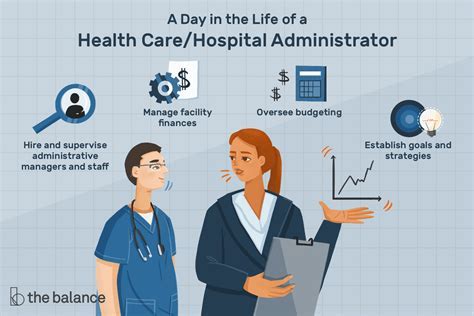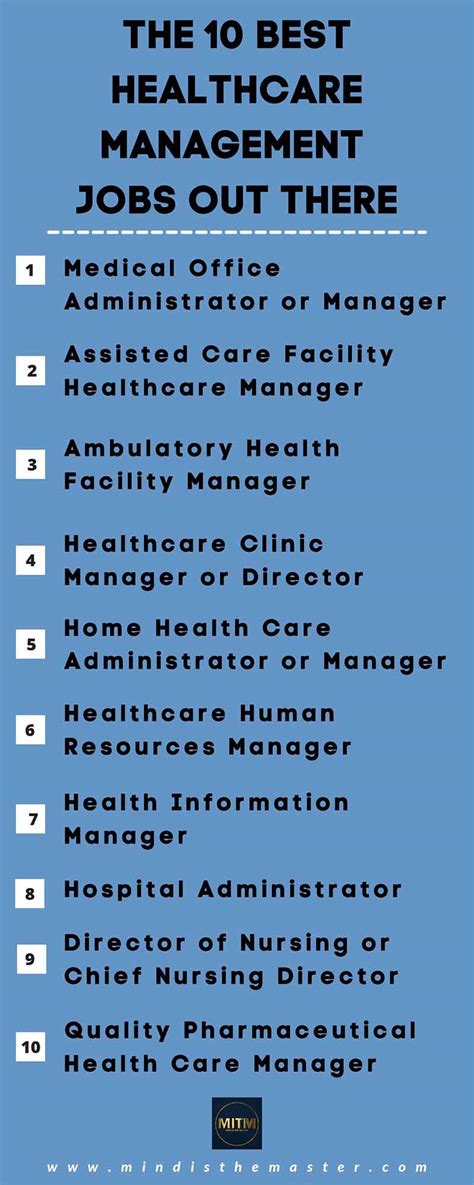Intro
Explore the latest healthcare management vacancies and discover top jobs and career paths in the industry. Learn about hospital administration, healthcare consulting, and medical management roles, and find out how to advance your career in healthcare leadership. Get insights into the skills and qualifications required for success in this field.
The healthcare industry is one of the fastest-growing sectors in the world, driven by an aging population, an increased focus on healthcare access, and advancements in medical technology. As a result, the demand for skilled healthcare professionals is on the rise, and healthcare management vacancies are becoming increasingly prominent. In this article, we will explore the top jobs and career paths in healthcare management, providing insights into the skills and qualifications required for these roles.

The Importance of Healthcare Management
Healthcare management is a critical component of the healthcare system, responsible for overseeing the delivery of high-quality patient care, managing resources, and ensuring the financial sustainability of healthcare organizations. Effective healthcare management is essential for improving patient outcomes, reducing healthcare costs, and enhancing the overall efficiency of healthcare services.
Key Skills and Qualifications
To succeed in healthcare management, individuals require a combination of clinical, business, and leadership skills. Some of the key skills and qualifications include:
- A bachelor's or master's degree in healthcare administration, business, or a related field
- Clinical experience in a healthcare setting
- Strong leadership and communication skills
- Ability to analyze data and make informed decisions
- Knowledge of healthcare regulations and policies
- Strategic thinking and problem-solving skills
Top Jobs in Healthcare Management
Here are some of the top jobs in healthcare management, along with their median salaries and job descriptions:
- Hospital Administrator: $119,840/year Hospital administrators oversee the day-to-day operations of hospitals, ensuring that patients receive high-quality care while managing resources and budgets.
- Clinical Manager: $83,610/year Clinical managers supervise clinical staff, develop policies and procedures, and ensure that patients receive evidence-based care.
- Healthcare Consultant: $85,260/year Healthcare consultants work with healthcare organizations to improve their operations, reduce costs, and enhance patient outcomes.
- Medical Director: $208,000/year Medical directors oversee the medical staff, develop clinical policies, and ensure that patients receive high-quality care.
- Health Information Manager: $119,840/year Health information managers oversee the collection, analysis, and dissemination of health data, ensuring that healthcare organizations have the information they need to make informed decisions.

Career Paths in Healthcare Management
Healthcare management offers a range of career paths for individuals who are passionate about healthcare and management. Here are some potential career paths:
- Entry-Level Positions: Entry-level positions in healthcare management include roles such as healthcare administrator, clinical coordinator, or health information technician.
- Mid-Level Positions: Mid-level positions include roles such as clinical manager, healthcare consultant, or health information manager.
- Senior-Level Positions: Senior-level positions include roles such as hospital administrator, medical director, or chief operating officer.
- Executive-Level Positions: Executive-level positions include roles such as chief executive officer, chief financial officer, or chief information officer.
Professional Development
To advance in healthcare management, individuals can pursue professional development opportunities such as:
- Certifications: Certified Healthcare Administrator (CHA), Certified Professional in Healthcare Management (CPHM)
- Education: Master's degree in healthcare administration, business, or a related field
- Networking: Joining professional organizations such as the American College of Healthcare Executives (ACHE) or the Healthcare Financial Management Association (HFMA)

Challenges and Opportunities in Healthcare Management
Healthcare management faces a range of challenges, including:
- Staffing shortages: Healthcare organizations are facing staffing shortages, particularly in nursing and primary care.
- Financial constraints: Healthcare organizations are under pressure to reduce costs while maintaining quality care.
- Regulatory requirements: Healthcare organizations must comply with a range of regulations, including the Affordable Care Act and the Health Insurance Portability and Accountability Act (HIPAA).
Despite these challenges, healthcare management offers a range of opportunities, including:
- Innovation: Healthcare management is driving innovation in healthcare, from telemedicine to artificial intelligence.
- Collaboration: Healthcare management is fostering collaboration between healthcare organizations, payers, and patients.
- Leadership: Healthcare management offers opportunities for leadership and professional development.

Conclusion
Healthcare management is a dynamic and rewarding field that offers a range of career paths and opportunities for professional development. By understanding the key skills and qualifications required for healthcare management, individuals can pursue a career that makes a difference in the lives of patients and healthcare organizations.
We encourage you to share your thoughts and experiences in healthcare management in the comments section below. What are some of the challenges and opportunities you have faced in your career? How do you think healthcare management can be improved?
What is healthcare management?
+Healthcare management is the process of overseeing the delivery of high-quality patient care, managing resources, and ensuring the financial sustainability of healthcare organizations.
What are the key skills and qualifications required for healthcare management?
+The key skills and qualifications required for healthcare management include a bachelor's or master's degree in healthcare administration, business, or a related field, clinical experience, strong leadership and communication skills, and knowledge of healthcare regulations and policies.
What are some of the top jobs in healthcare management?
+Some of the top jobs in healthcare management include hospital administrator, clinical manager, healthcare consultant, medical director, and health information manager.
